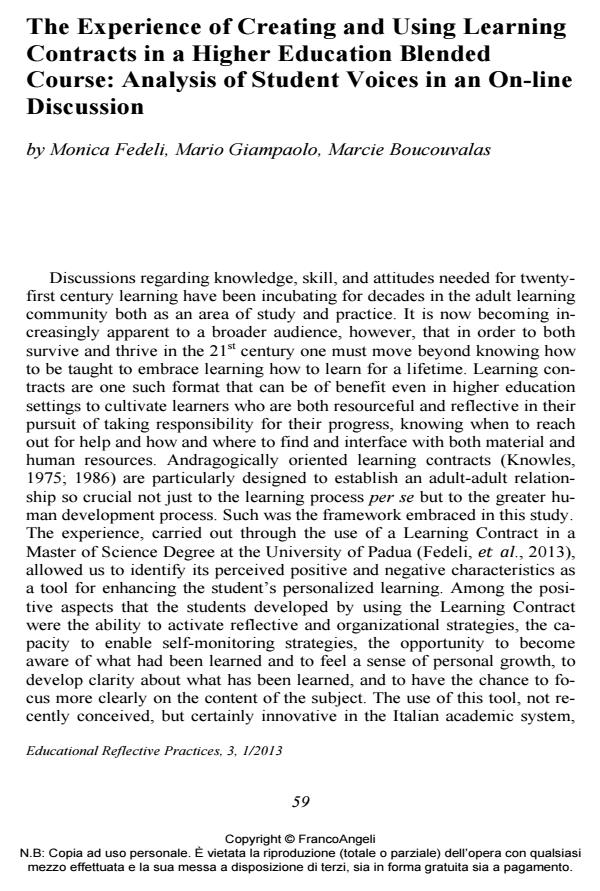The Experience of Creating and Using Learning Contracts in a Higher Education Blended Course: Analysis of Student Voices in an On-line Discussion
Journal title EDUCATIONAL REFLECTIVE PRACTICES
Author/s Monica Fedeli, Mario Giampaolo, Marcie Boucouvalas
Publishing Year 2013 Issue 2013/1
Language English Pages 18 P. 59-76 File size 229 KB
DOI 10.3280/ERP2013-001005
DOI is like a bar code for intellectual property: to have more infomation
click here
Below, you can see the article first page
If you want to buy this article in PDF format, you can do it, following the instructions to buy download credits

FrancoAngeli is member of Publishers International Linking Association, Inc (PILA), a not-for-profit association which run the CrossRef service enabling links to and from online scholarly content.
This paper illustrates students’ reflections on the experience of implementing Malcolm Knowles’s 1986 model of learning contracts in an online discussion forum. The study was an attempt to improve and adapt the tool to a master’s degree course at the University of Padua. Based on this qualitative inquiry three major themes come to light in our analysis : (a) Learning Contract and the learning process, (b) Characteristics of Learning Contracts and (c) Dynamics of collaboration. The findings encouraged our reflection on how to improve the contract and better involve the students in their learning process of becoming more self-directed. Finally, we can affirm that the Learning Contract can be considered an appropriate tool to elicit reflection for the learner and facilitator in higher education.
- Andresen, M.A. (2009). Asynchronous discussion forums: success factors, outcomes, assessments, and limitations. Educational Technology and Society, 12(1), pp. 249-257.
- Armstrong, K. (2010). High wire act: The perils, pitfalls and possibilities of online discussions. Word Academy of Science Engineering and Technology, 46, 217-222. Retrieved from http://www.waset.org/journals/waset/v46.php, [Accessed 20/06/13].
- de Vries, H., Elliott, M.N., Kanouse, D.E., & Teleki, S. (2008). Using pooled kappa to measure interrater agreement across many items. Field Methods, 20(3), 272-282.
- Dressel, P.L., & Thompson, M.M. (1973). Independent study: New interpretations of concepts, practices and problems. San Francisco, CA: Jossey-Bass.
- Di Nubila, R. (2008). Saper fare formazione: Manuale di metodologia per giovani formatori. Lecce: Pensa Multimedia.
- Fahy, P.J., Crawford, G., Ally, M., Cookson, P., Keller, V., & Prosser, F.
- (2000). The development and testing of a tool for analysis of computer
- mediated conferencing transcripts. Alberta Journal of Educational Research, 46(1), pp. 85-88.
- Fedeli, M., Giampaolo, M., & Coryell, J. (2013). The use of learning contracts in the Italian University System. Adult Learning, 24(3) (in press). Fleiss, J.L. (1971). Measuring nominal scale Agreement among many raters. Psychological Bulletin, 76(5), pp. 378-382.
- Haney, W., Russell, M., Gulek, C., & Fierros, E. (1998). Drawing on education: Using student drawings to promote middle school improvement. Schools in the Middle, 7(3), pp. 38- 43.
- Hillman, D. (1999). A new method for analyzing patterns of interaction. The American Journal of Distance Education, 13(2), pp. 37-47.
- Houle, C.O. (1961). The inquiring mind. Madison, WI: University of Wisconsin Press.
- Knowles, M.S. (1975). Self-directed learning: A guide for learners and teachers. New York, NY: Cambridge Book Company.
- Knowles, M.S. (1986). Using learning contracts. San Francisco, CA: Jossey-Bass Publishing.
- Kolb, D.A. (1984). Experiential learning: Experience as the source of learning and development. Englewood Cliffs, NJ: Prentice Hall Landis, J. R., & Koch, G.G. (1977). The measurement of observer agreement for categorical data. Biometrics, 33(1), pp. 159-74.
- Põldoja, H., & Väljataga, T. (2010). Externalisation of a PLE: Conceptual design of LeContract. Available at: http://pleconference.citilab.eu/cas/wpcontent/uploads/2010/06/ple2010_submission_68.pdf [Accessed 20/06/13].
- Salmon, G. (2000). E-moderating: The key to teaching and learning online. London: Kogan Page.
- Tough, A.M. (1967). Learning without a teacher: A study of tasks and assistance during adult self-learning projects. Toronto, Ontario, Canada: Ontario Institute for Studies in Education.
- Tough, A.M. (1979). The adult’s learning projects. Toronto: Ontario Institute for Studies in Education.
Monica Fedeli, Mario Giampaolo, Marcie Boucouvalas, The Experience of Creating and Using Learning Contracts in a Higher Education Blended Course: Analysis of Student Voices in an On-line Discussion in "EDUCATIONAL REFLECTIVE PRACTICES" 1/2013, pp 59-76, DOI: 10.3280/ERP2013-001005